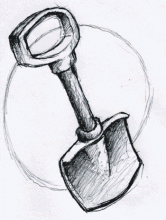Can you dig it. Drupal nested array that is.
Submitted by clemens on Fri, 2013/11/15 - 12:14pm
I sometime need to check arrays for their values dispersed around. Just dumping the array is OK when interested in a particular key or value. But what about those big info arrays from hook_token_info, hook_menu etc. This is what I did.
// dumper.php
function arrayToProperties($values) {
$is_array = is_array($values);
if (!$is_array) {
return $values;
}
$result = array();
while ($is_array) {
$is_array = FALSE;
foreach ($values as $key => $data) {
if (is_array($data)) {
foreach ($data as $sub_key => $sub_data) {
$fold = _array_fold($sub_data);
if (is_array($fold)) {
foreach ($fold as $k => $val) {
$result[$key . '.' . $sub_key . '.' . $k] = $val;
}
}
else {
$result[$key . '.' . $sub_key] = $fold;
}
}
}
else {
$result[$key] = $data;
}
}
}
return $result;
}This function was developed for https://drupal.org/project/drush_entity. It does a recursive concatenation of nested keys flattening the array into long key-value.
$tree = array(
'a' => array(
'b' => 'value b',
'c' => array(
'd' => 'value d',
),
),
);
$lines = arrayToProperties($tree));This results into an array structure like
Array
(
[a.b] => value b
[a.c.d] => value d
)This is still not output to use with ie diff so we need some more work. We want to print both the key and value.
// dumper.php cont.
function printArrayAsProperties($info) {
$lines = arrayToProperties($info);
array_walk($lines, function(&$item, $key) {
$item = "$key = $item";
});
echo join("\n", $lines) . "\n";
}Now if your want to know some drupal array structure try this
// dumper.php cont.
//list($info) = menu_router_build();
$info = token_info();
printArrayAsProperties($info);Next run it against a drupal site with drush or use devel dpm or dsm.
drush @drupal.d7 php-script dumper.phpThis results into
types.comment.name = Comments
types.comment.description = Tokens for comments posted on the site.
types.comment.needs-data = comment
types.node.name = Nodes
types.node.description = Tokens related to individual content items, or "nodes".
types.node.needs-data = node
types.site.name = Site information
types.site.description = Tokens for site-wide settings and other global information.
types.date.name = Dates
types.date.description = Tokens related to times and dates.
types.file.name = Files
types.file.description = Tokens related to uploaded files.
types.file.needs-data = file
...
tokens.user.url.description = The URL of the account profile page.
tokens.user.edit-url.name = Edit URL
tokens.user.edit-url.description = The URL of the account edit page.
tokens.user.last-login.name = Last login
tokens.user.last-login.description = The date the user last logged in to the site.
tokens.user.last-login.type = date
tokens.user.created.name = Created
tokens.user.created.description = The date the user account was created.
tokens.user.created.type = dateNow we can dig some tokens :)
drush @drupal.d7 php-script dumper.php | grep "^tokens\.user"
